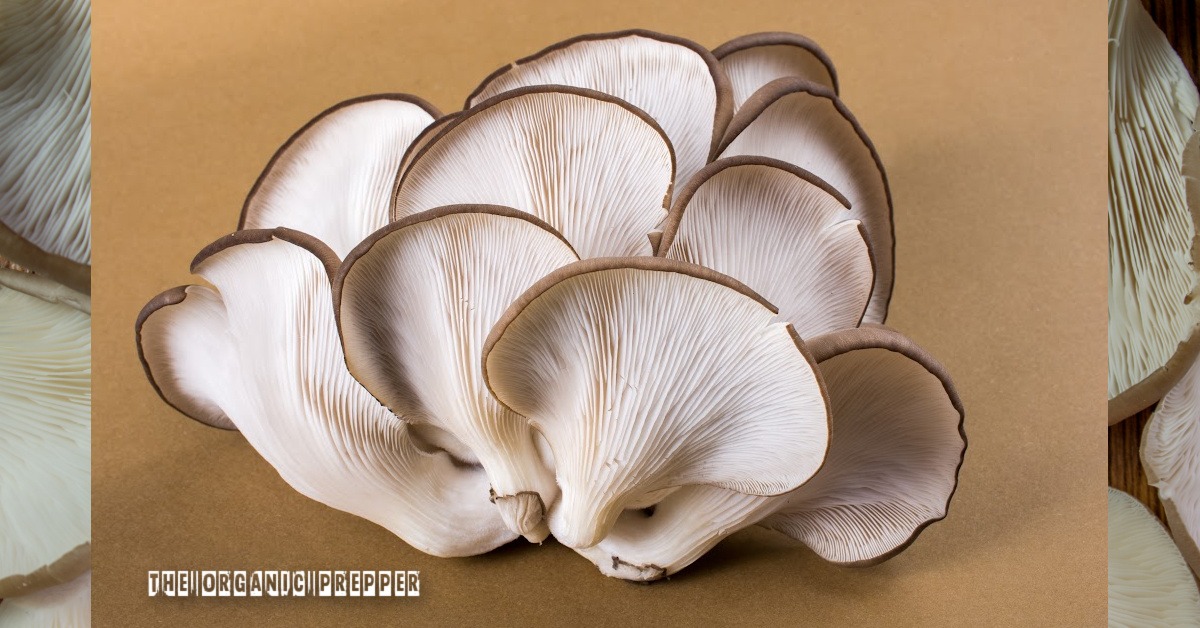Why Oyster Mushrooms Are a Self-Reliant Health Gold Mine


[ad_1]
If you’re new here, you may want to subscribe to my RSS feed. Thanks for visiting!
(Psst: The FTC wants me to remind you that this website contains affiliate links. That means if you make a purchase from a link you click on, I might receive a small commission. This does not increase the price you’ll pay for that item nor does it decrease the awesomeness of the item. ~ Daisy)
Oyster mushrooms (Pleurotus spp.) are an incredible genus that comes in many colors, are very easy to grow, and, according to Hobbs, are the third most cultivated mushroom in the world. They’ll grow in substrates ranging from supplemented sawdust to straw to toilet paper rolls and coffee grounds, making them an easy choice, especially for beginners.
Still, the concept of “easy to grow” is a relative term. Mushrooms aren’t philodendrons. They require some specialized spaces and techniques, along with a bit of extra effort. So what’s in it for the grower? What are the benefits of growing oysters and other mushroom varieties? Read on!
Oyster mushrooms are absolutely packed with nutrients.
According to Hobbs and other sources, oyster mushrooms are very nutritious. Some species contain up to 35% protein. They’re very digestible and high in fiber & minerals, containing 15-20% beta-glucans. Stamets notes that oyster mushrooms contain high amounts of vitamins B, C, and niacin. Healthline gives this nutritional breakdown for 1 cup (85 grams) of fresh oyster mushroom:
- Calories: 28
- Carbs: 5 grams
- Protein: 3 grams
- Fat: <1 gram
- Fiber: 2 grams
- Niacin: 27% of the Daily Value (DV)
- Pantothenic acid (vitamin B5): 22% of the DV
- Folate: 8% of the DV
- Choline: 8% of the DV
- Potassium: 8% of the DV
- Iron: 6% of the DV
- Phosphorus: 8% of the DV
- Zinc: 6% of the DV
In addition, in these days of inflation, mushrooms can be a valuable meat substitute.
(Looking for more information on improving your self-resilience? Check out our free QUICKSTART Guide to building a 3-layer food storage system.)
Then there are the medicinal benefits!
The Healthline article quoted above, along with both Stamets and Hobbs, discusses various studies that suggest a role for oyster mushrooms in blood sugar regulation. Hobbs notes the presence of natural statins in these, most notably a molecule closely related to lovastatin. He also notes possible benefits in cholesterol lowering and atopic dermatitis along with mild immunomodulating effects. Some preliminary studies have even shown a possible anti-tumor effect along with anti-inflammatory properties and positive effects on gut health. So what’s not to love?
MedicineNet points out several of these benefits and more, including heart health benefits and the inhibition of free radicals. Both this article and Hobbs point to studies showing that the blood regulation properties of this mushroom can help prevent type 2 diabetes.
Hobbs relates a small study of volunteers with type 2 diabetes who ate 3-4 grams of freeze-dried and powdered oyster mushroom followed by 75 grams of glucose in 300 mL of water for two weeks. Blood sugar levels declined by 15-16.5% compared to controls, while insulin levels increased by 21-22%. He himself notes, however, that human studies are few and far between enough to warrant some caution.
He also notes immunomodulating, anti-inflammatory, and antiallergic effects in children with recurrent respiratory viruses. Interesting! Aren’t we, as a global society having problems with these? SARS-Cov-2 and RSV are respiratory viruses.
If you’re a farmer or homesteader, the used substrate also generates several useful by-products.
According to Stamets, the spent straw can be fed to chickens, pigs, and cattle. Mycelial substrate is also great for building compost and new soil! This is especially good to know when I have to toss a moldy sawdust block. At least something good will come from my efforts, if not what I was trying to grow!
Straw, sawdust blocks, and coffee grounds can be tossed into the compost bin or added to trenches and lasagna gardening layers. Stamets notes that at least five oyster species secrete metabolites toxic to nematodes. Additionally, the spent straw can be used to grow wine caps outdoors. Wine caps, in addition to being yummy, are also used in mycoremediation, a fancy word for cleaning pollutants out of soils via fungi. Be aware, however, that any mushroom used for this purpose should not be eaten, as the pollutant(s) will be stored within the mushroom.
(Want uninterrupted access to The Organic Prepper? Check out our paid-subscription newsletter.)
There are, however, some disadvantages and side effects of oyster mushrooms to be aware of.
The mushrooms are quick to spoil, so once you pick them, either dehydrate or use them! They won’t last more than a couple of days in the refrigerator.
Stamets notes that these attract flies to the grow room like no other species, and I can validate that! The flies are attracted to the heavy spore load. Flies carry mold, which can contaminate the entire growing area. These mushrooms drop spores to the point that can be a health hazard, which is one good reason to keep a good filter over your duct fan’s outflow in your Martha tent.
According to MedicineNet, they may cause allergies and are not for sensitive stomachs.
Hobbs notes that there are a few toxic look-alikes, so be very careful if you go foraging! I cannot recommend a good field guide enough! Even better, take a class from someone local who can help you. I know a woman locally who’s poisoned herself twice by eating the wrong mushroom, and she assured me that it wasn’t fun! So be careful! Some of those look-alikes are lethal.
Oyster mushrooms are an incredible genus.
They’re easy to grow and have a wide variety of both nutritional and medicinal benefits. However, I cannot emphasize enough that we here at The Organic Prepper DO NOT give medical advice! My purpose in this article is to present information. What you, the reader, choose to do with that information is purely and solely up to you.
Do you grow your own mushrooms? Do you have any tips or questions? What are your thoughts on oyster mushrooms in particular? Tell us in the comments below!
About Amy Allen
Amy Allen is a professional bookworm and student of Life, the Universe, and Everything. She’s also a Master Gardener with a BS in biology, and has been growing food on her small urban lot since 2010.
[ad_2]
Source link
Recent Posts
Dear Diary, It’s Me, Jessica: Part 16
[ad_1] If you're new here, you may want to subscribe to my RSS feed. Thanks…
Google Faces Lawsuit After $5M in Crypto Stolen via Play Store App
[ad_1] A Florida woman, Maria Vaca, has sued Google in a California state court, alleging…
All About Water Purification: A Complete Tutorial
[ad_1] You may need to purify water to make it safe to drink. The process…
Protocol Village: Quai Releases Mainnet-Compatible Devnet, Crunch Lab Raises $3.5M
[ad_1] The latest in blockchain tech upgrades, funding announcements and deals. For the period of…
The Grim New Daily Life in Venezuela
[ad_1] If you're new here, you may want to subscribe to my RSS feed. Thanks…
World’s 3rd largest public pension fund buys $34M MicroStrategy shares
[ad_1] The third-largest public pension fund in the world has just bought nearly $34 million…
